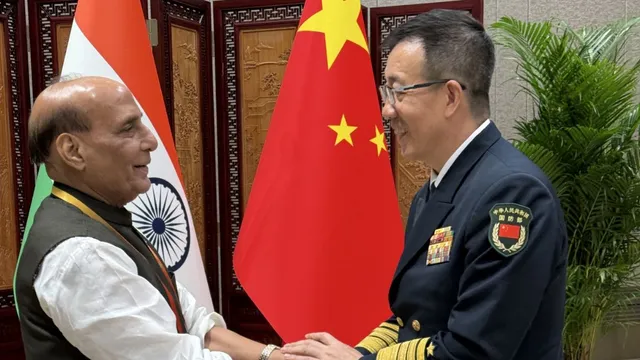- By Supratik Das
- Fri, 27 Jun 2025 01:11 PM (IST)
- Source:JND
In a major diplomatic effort, Indian Defence Minister Rajnath Singh met with China's Defence Minister Admiral Dong Jun on Thursday on the sidelines of the Shanghai Cooperation Organisation (SCO) Defence Ministers' Conference in Qingdao. Singh reiterated that there must be a permanent resolution of the India-China border disputes that have been ongoing for decades, India's Defence Ministry stated in a release on Friday. The world's two most populous nations, both nuclear powers, share a 3,800 km (2,400-mile), largely unmarked and disputed border in the Himalayas and have gone to war over it.
While the border has remained pretty much quiet during the past few decades, the 2020 Galwan incident affected bilateral relationships. The clash led to a four-year military standoff with both armies deploying tens of thousands of troops in the mountains until they reached a pact in October to step back, leading to a thaw in ties. China, Russia, India, Pakistan, and Iran are among the ten countries that make up the Security and Political Community (SCO) in Eurasia.
India's Four Point Proposal
Structured Roadmap For LAC Stability
At their highest-level military conversation in the past few months, Singh made a On the other hand, to ensure peace along the Line of Actual Control (LAC) and solve pending border issues. He urged stringent compliance with the 2024 Disengagement Agreement that paved the way for the recent withdrawal of troops at the remaining friction points in Eastern Ladakh, particularly Demchok and Depsang. Singh also called for sustained de-escalation efforts to prevent any fresh flare-ups and expedited boundary demarcation negotiations to ensure long-term border tranquility.
Crossing Trust Deficit Post-2020 Standoff
The Defence Minister emphasised the need to restore trust seriously eroded by the deadly 2020 Galwan clash, in which 20 Indian and four Chinese troops were killed, and led to a four-year military standoff along the Himalayas. The Defence Minister emphasised renewing the established mechanism for border management and urged establishing good neighbourly relations to provide peace and stability in Asia and beyond," said the ministry.
My statement at the SCO Defence Ministers’ Meeting in Qingdao (China) pic.twitter.com/dV3Bc0wtOk
— Rajnath Singh (@rajnathsingh) June 26, 2025
Kailash Mansarovar Yatra Resumes After Six Years
Concurrently with the bilateral negotiations, the Kailash Mansarovar Yatra to Tibet's autonomous region also resumed this year after a six-year gap. The pilgrimage was halted in 2020 during the COVID-19 pandemic and the resultant military standoff. Officials termed the resumption as a symbolic move towards easing tensions.
Singh Brings Up Cross-Border Terrorism, Refuses to Sign SCO Declaration
In a firm message to Beijing, Singh expressed concern at cross-border terrorism from Pakistan, pointing especially to the Pahalgam terror attack in Jammu and Kashmir on April 22, which had claimed 26 lives. Singh informed Admiral Dong about Operation Sindoor, India's continued counter-terror operation against terror infrastructure across the border.
Notably, India declined to sign the SCO Defence Ministers' joint declaration, protesting the failure any mention terrorism or the Pahalgam attack. The final SCO document instead included a mention of Balochistan, which India viewed as a subtle attempt to shift the focus from Pakistan’s role in sponsoring terror. EAM Dr S Jaishankar says, "The SCO was formed to fight terrorism. When Rajnath Singh went to the Defence Ministers' Meeting, and there was a discussion on the outcome document, one country said they do not want a reference to that. Rajnath Singh's view was, without that reference, that when the main purpose of the organisation is to fight terrorism, and you are not allowing a reference to that, he expressed his unwillingness to accept... SCO runs with unanimity. So Rajnath ji clearly said that if there is no mention of terrorism in the statement, we will not sign it."
ALSO READ: How US Hit Iran’s Deep Nuclear Bunkers? Pentagon Reveals | Watch The GBU-57 In Action
Thursday's meeting, which comes after the disengagement agreement concluded after Prime Minister Narendra Modi and President Xi Jinping met at the BRICS Summit last year, highlighted this deep-seated mistrust. While both countries are gearing up for the SCO leaders' summit this autumn, Singh's appeal for a formalised roadmap for border demarcation and trust-building measures could set the tone for a gradual normalisation of relations, if Beijing responds in kind.

